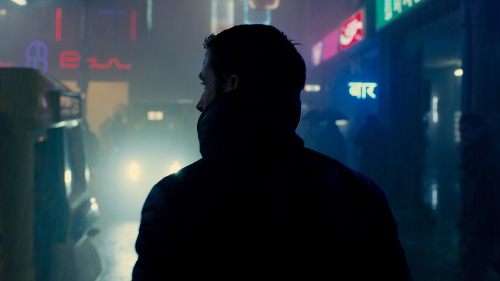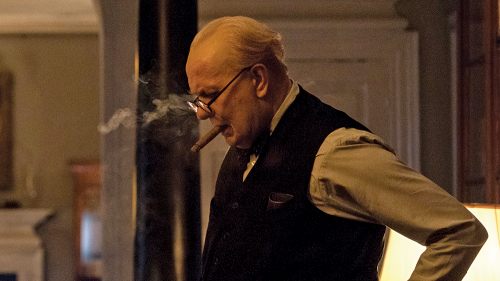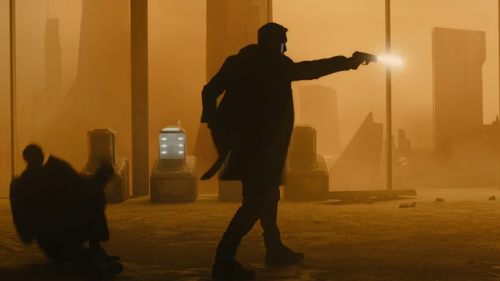BLADE RUNNER 2049 Review: Just As Beautiful (And Frustrating) As The Original
Blade Runner 2049 is not a film for today. It might think it is, with various allusions to our planet’s violent rejection of human civilization through climate change, our obsession with technological perfection, and our inherent prejudices. The themes are certainly relevant, but in every other way, this is a film out of time. Denis Villeneuve, cinematographer Roger Deakins, production designer Dennis Gassner, and the rest of the artists responsible for this movie have crafted one of the most gorgeous pieces of cinema exhibited since the original film. It’s a meticulously made visual wonder that should put any other filmmaker dabbling in sci-fi futurism on notice. That the look of this movie compares favorably to perhaps the most aesthetically influential motion picture of the last 40 years is an accomplishment worth noting. The problem isn’t that Blade Runner 2049 is a worthy companion to the first movie. It’s that it’s almost too good at being that.
A sequel to Blade Runner. That still sounds weird to me, in the way that 2010: The Year We Made Contact rubs me the wrong way. Blade Runner (especially the Director’s/Final Cut) was a film built on ambiguity. “Is Deckard a replicant?” was the primary question audiences latched on to, but just about everything about it was open to interpretation. Sequels, by their nature have to answer questions, or at least address them in a way that removes much of their holy mystery. The recent Twin Peaks revival series solved that problem by inventing a bunch of brand new mysteries, never betraying the inscrutable nature of its predecessor. 2010 took an abstract film and made it frustratingly concrete. Blade Runner 2049 splits the difference. There are questions and there are mysteries — so much so that critics have been asked by the filmmakers and the studio to reveal as little of the plot as possible — but they don’t possess the same elemental magic of the original. Where the first film was about the creeping loss of humanity — a perfect example of George Lucas’ idea of the “tone poem” — the sequel is about trying to get it back, which necessitates an emphasis on the tangible.
I can tell you that Ryan Gosling plays a new breed of Blade Runner. I can tell you that Harrison Ford shows up eventually for an extended cameo. Gosling’s character, K, discovers a secret that changes everything we know about the universe of the first movie. That’s about all I’m at liberty to discuss, but frankly, I don’t want to tell you anything. If any critic throws a temper tantrum about not being able to blab about all the secrets inside this movie, they have a crueler heart than I. My charge is not to blow the deal for you, it’s to tell you if that deal is a worthwhile investment. It is, with caveats.
This is not a movie made for the binary, “rotten or fresh” critical dynamic, but then again, neither was the first movie. When Blade Runner was released, Siskel and Ebert had yet to perfect the “thumbs up/thumbs down” gimmick that would make them pop culture icons. In their initial review, they’re giving a “yes or no” to each film. Gene says “No” when asked if you should see it. “Roger really enjoyed the special effects, but where was the story,” he asks in their summation. This strikes us now as a ridiculous question and even Siskel came on board the critical reevaluation in the 1990s. Blade Runner is not a rip-roaring adventure story. It’s a character piece about such heady ideas as the nature of existence, our relationship to God, and our fear of mortality. That’s just scratching the surface of what you can sink your teeth into. The theatrical cut is at times painfully dull, with long stretches of silence mixed with terrible narration and mesmerizing shots of a grotesque industrial future hellscape. It trades on film noir clichés about hardboiled, emotionally distant detectives and the shady women who upend their lives. It has a sex scene that’s borderline unpleasant to watch because of its gender politics. The Director’s Cut took the narration out and made it even quieter and longer. It transcends the way in which we commodify film criticism. “Is it good?” “Should you spend your money on it?” In the shadow of Star Wars, it seemed wanting. It’s challenging. It’s not fun.
Blade Runner 2049 is all of that again, but without the cult mystique of the misunderstood classic. Like so many film nerds of my generation, I discovered Blade Runner through whispered word of mouth and fell into a deep, obsessive wormhole of production minutiae, rumor, and dorm room theorizing. Paul M. Sammon’s seminal account of the making of Blade Runner, Future Noir, was sacred text. Blade Runner 2049 could never hope to capture that, because fandoms crop up for quirky, beloved bombs like Valerian and the City of a Thousand Planets almost immediately. Critics are also keenly aware of how today’s cinematic trash could very easily end up being tomorrow’s treasure. There are no whispers anymore, only shouts and petitions and tweetstorms.
Blade Runner 2049 does its level best to capture the bracing eccentricity and opaqueness of the first film. Gosling gives an appropriately icy performance. Leto channels the lofty pontification of Joe Turkel as Tyrell, but never falls into caricature. The work of Leto in the role of messianic entrepreneur Niander Wallace is one of the true pleasant surprises of the movie, considering how polarizing he tends to be. Overall, the performances hit the very specific tone of Blade Runner incredibly well. The notes that aren’t hit with as much success are the ones created by Hans Zimmer and Benjamin Wallfisch, late replacements for Villeneuve mainstay Johann Johannsson. Boy, do they try, though. The hints of Vangelis’ classic score are there, but blunted by the necessities of modern film music. A chase scene in the third act contains music so out-of-place and generic that one might be fooled into thinking they forgot to replace the temp track.
The music works best when 2049 tries to replicate (pun intended, natch) the hypnotizing flyovers of future Los Angeles that wowed us the first time around. There’s an eerie stillness in this picture that could alienate audiences expecting fistfights and laser blasts, which is so appropriate for this universe. If you go into a Blade Runner sequel expecting non-stop action, you have been completely led astray. This is a nearly three-hour movie that some will find boring. If it wasn’t a bit slow-footed in places, I’d be upset.
In both conception and execution, Blade Runner 2049 is a significantly more competent follow-up to a cinephile favorite from 1982 than TRON: Legacy, which made a go of updating a misunderstood sci-fi spectacle by turning it into a magnificently beautiful bauble with a memorable soundtrack and little else. 2049 had the benefit of the participation of both Ridley Scott and original screenwriter Hampton Fancher. The opening scene lifts from Fancher’s first draft of Blade Runner, which anyone who has read Future Noir will recognize immediately. All that’s missing is the fedora from the storyboards.
The twists of 2049 are equally as ham-fisted and corny as the ones in Legacy, though. The same goes for the clumsy creation of a lead character that’s different enough from the first protagonist, but mostly the same. Star Wars: The Force Awakens stumbled there, too. Rey was Rey, but Rey was also basically Luke Skywalker. K has subtle points of departure from Rick Deckard, but he’s still just as detached, world-weary, and unknowable. More critically, Legacy and 2049 share an inability to update the themes of the previous work to better fit our current cultural moment. In 2049’s case, the big stumble is in its conception of women within the film noir world.
After my screening, I had a chat with the great entertainment journalist and writer Devon Maloney. I was stupefied by the movie, but couldn’t put it into words yet. She immediately, strongly latched onto portrayal of women. Without delving too much into verboten territory, it’s clear that the archetypes of noir were leaned on heavily in 2049. It will take me a second viewing to figure out if this film passes the Bechdel Test, but I’m 90 percent sure it does not. Of course, one could argue that a movie about synthetic slaves need not worry about such matters and that violence against the female characters is a comment on the issue, but when the story revolves so much around love, sex, and relationships, it’s hard to completely wave off.
I’ll leave the unpacking of 2049’s gender politics to someone more qualified, but I’m confident it will bother people. The social context in which films are made matters, though, especially in 2017. Movies don’t exist in a vacuum and they should not make you shut your brain off. The legacy of Blade Runner would not allow its sequel to get away with that and nor should you. This is a film we will debate and discuss for some time; maybe not to the same level as the first one, but it does ask provocative questions, just in a more blatant fashion. While the structure of film criticism asks me to answer the particular question of whether or not Blade Runner 2049 is good (overall, it is), the rest of them are up to the imagination. That’s exactly how it should be.



